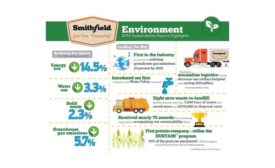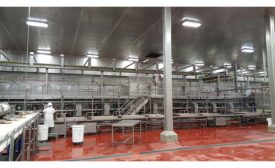Sustainable Solutions for Cold Foods
Smithfield Foods' new sustainability report announces first company-wide water policy
The adoption of its first written Water Policy notes the company's commitment to protecting water quality and conservation across all operations.
May 11, 2017
How green technologies produce more sustainable foods
Discover how many of today’s food processors implement green technologies to achieve sustainability targets.
May 10, 2017
Tyson Foods commits to sustainable approach to better workplace
By investing in sustainability, Tyson Foods expects to create a beneficial cycle of contributing to the future, while paying for itself in the present.
May 1, 2017
Wastewater treatment project spurs growth at Fairlife, Continental Dairy
Both companies are expanding operations to include new products and product lines.
March 30, 2017
Study shows reusable plastic containers as sustainable choice for fresh produce packaging
The LCA reviewed the environmental impact of reusable plastic containers and display-ready corrugated fiber containers and non-display-ready corrugated fiber containers for packaging produce.
March 20, 2017
U.S. solar market experiences record-breaking year
Over the next five years, the cumulative U.S. solar market is expected to nearly triple in size, even as a slight dip is expected in 2017.
March 13, 2017
The benefits of working with an energy efficient cold storage provider
For commercial temperature-controlled warehouses across the United States, going green is more than simply turning off the lights at the end of the night.
March 8, 2017
Nestlé announces 2020 sustainability commitments
One example is a global commitment to reduce the sugar added in products by 5% by 2020.
March 7, 2017
Elevate your expertise in refrigerated and frozen foods with unparalleled insights and connections.
Get the latest industry updates tailored your way.
JOIN TODAY!Copyright ©2024. All Rights Reserved BNP Media.
Design, CMS, Hosting & Web Development :: ePublishing









